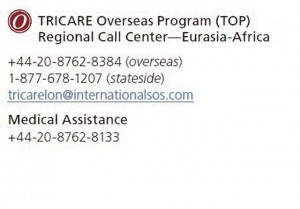Europe is the perfect playground for the winter sports enthusiast, and many service members are packing up their families and headed to the mountains for a holiday in the snow. However, accidents on the steep slopes of the Alps are common and injuries can occur.
 Spending a vacation in a foreign emergency room can be stressful enough, but service members must also take into account the process of paying for medical treatment. If emergency treatment becomes necessary while traveling, service members should be prepared with a plan.
Spending a vacation in a foreign emergency room can be stressful enough, but service members must also take into account the process of paying for medical treatment. If emergency treatment becomes necessary while traveling, service members should be prepared with a plan.
According to www.tricare.mil, emergency medical services should be contacted immediately in the event of a medical, maternity or psychiatric emergency. However, it is necessary for travelers to be aware of the possibility that the clinic where they receive treatment may not accept TRICARE. In cases of emergency, military families should know their options according to their level of coverage.
“For TRICARE Prime Overseas members, the first step to ensure emergency treatment will be properly covered is to call International SOS,” said Senior Master Sgt. Jessica Dunn, 86th Medical Support Squadron TRICARE operations and patient administration superintendent. “Some hospitals in Europe will not recognize TRICARE, so they will want patients to pay out of pocket. To avoid that, you want to call ISOS, so they can coordinate with the hospital to arrange to send payments so they will release you.”
If payment must be made up front, TRICARE will reimburse members if they have a receipt of the transaction.
“Retirees and their families traveling abroad may face different challenges when they seek emergency treatment at foreign hospitals,” Dunn said. “Retirees are covered by the TRICARE Standard policy and may be seen anywhere without a referral, but will have to pay the standard 25 percent co-pay for treatment. They can still call ISOS for help and counseling, but ISOS will not be able to complete necessary paperwork for claims.”
There is always a risk during international travel when it comes to medical services, but being prepared for possible issues will take some of the headache out of paying for treatment.
“Always pre-plan, and make sure you have all the information that you need,” Dunn said. “ISOS will take care of you.”
More information can be found at www.tricare-overseas.com, www.tricare.mil/overseas or in the TRICARE Overseas Program Passport, available at the TRICARE Service Center in the Ramstein Clinic.


